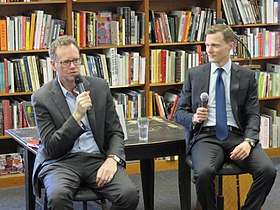Francis Gavin
Francis J. Gavin is an American historian currently serving as the Giovanni Agnelli Distinguished Professor and Director of the Henry A. Kissinger Center for Global Affairs at Johns Hopkins University School of Advanced International Studies in Washington, D.C. He is also the Chairman of the Board of Editors for the Texas National Security Review.[1]
Academic history

Prior to his tenure at Johns Hopkins SAIS, Gavin was a Professor of Political Science at MIT, where he also served as the inaugural Frank Stanton Chair in Nuclear Security Policy Studies. Before joining MIT, he taught at the University of Texas from 2000 to 2013. While there, he was named the Tom Slick Professor of International Affairs at the Lyndon B. Johnson School of Public Affairs in 2005, and served as the Director of the Robert S. Strauss Center for International Security and Law.[2]
Education
Gavin received his PhD and MA in History from the University of Pennsylvania, a Master of Studies in Modern European History from Oxford and a BA in Political Science from the University of Chicago.[2][3]
Books
- Gold, Dollars and Power: The Politics of International Monetary Relations, 1958-1971 (University of North Carolina Press, 2004)[4]
- Nuclear Statecraft: History and Strategy in America's Atomic Age (Cornell University Press, 2012)[5]
- Chaos in the Liberal World Order: The Trump Presidency and International Politics in the Twenty-First Century (edited with Robert Jervis, Joshua Rovner, and Diane Labrosse, Columbia University Press 2018)
References
- ↑ "Author at Texas National Security Review: Francis J. Gavin".
- 1 2 "Francis J. Gavin". www.strausscenter.org. Retrieved 2018-09-07.
- ↑ https://kissinger.sais-jhu.edu/gavin.html
- ↑ Reviews of Gold, Dollars, and Power:
- James, Harold (June 2004), The Journal of Economic History, 64 (2): 629–631, doi:10.1017/S0022050704332912, JSTOR 3874807
- Eichengreen, Barry (December 2004), The American Historical Review, 109 (5): 1542–1543, doi:10.1086/530951
- Eckes, Alfred E. (March 2005), The Journal of American History, 91 (4): 1530–1531, doi:10.2307/3660306
- Selva, Simone (March 2005), Enterprise and Society, 6 (01): 149–151, doi:10.1017/s146722270001435x
- Widmaier, Wesley W. (Summer 2005), "Review", Journal of Cold War Studies, 7 (3): 153–155
- Zeiler, Thomas W. (September 2005), The International History Review, 27 (3): 685–687, JSTOR 40109664
- Jackson, Ian (Spring 2006), International Journal, 61 (2, Global China): 520–522, doi:10.2307/40204182
- Helleiner, Eric (April 2007), Journal of Cold War Studies, 9 (2): 170–171, doi:10.1162/jcws.2007.9.2.170
- ↑ Reviews of Nuclear Statecraft:
- Freedman, Lawrence D. (May–June 2013), Foreign Affairs, 92 (3): 171–172, JSTOR 23526859
- Doyle, Suzanne (July 2013), History, 98 (331): 495–497, doi:10.1111/1468-229x.12017_43
- Mattox, John Mark (July–August 2013), "Review", Military Review, 93 (4)
- Siracusa, J. M. (August 2013), Journal of American History, 100 (2): 598–599, doi:10.1093/jahist/jat292
- Nolan, Janne E. (November 2013), "Nuclear Politics", The Nonproliferation Review, 20 (3): 567–571, doi:10.1080/10736700.2013.849909
- Tal, David (April 2014), The American Historical Review, 119 (2): 566–567, doi:10.1093/ahr/119.2.566
- Joshi, Shashank (July 2014), The RUSI Journal, 159 (4): 119–120, doi:10.1080/03071847.2014.946707
- Craig, Campbell (March 2015), Cold War History, 15 (2): 258–262, doi:10.1080/14682745.2015.1018477